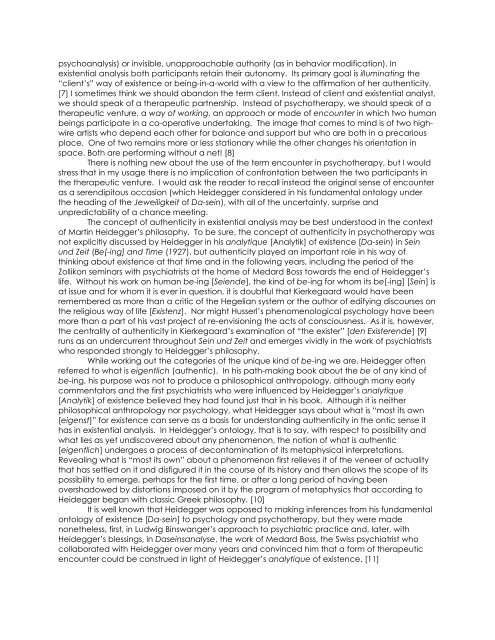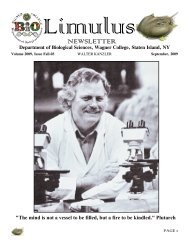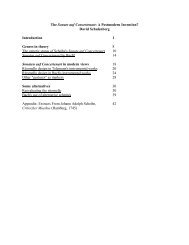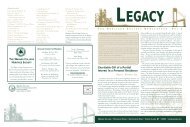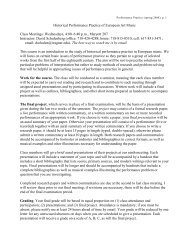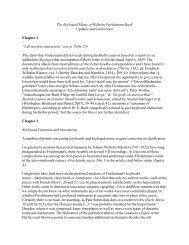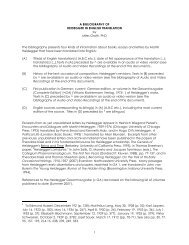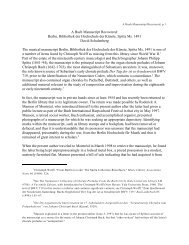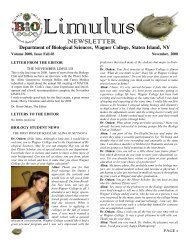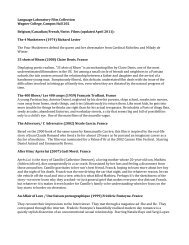SEVEN PAPERS ON EXISTENTIAL ANALYSIS ... - Wagner College
SEVEN PAPERS ON EXISTENTIAL ANALYSIS ... - Wagner College
SEVEN PAPERS ON EXISTENTIAL ANALYSIS ... - Wagner College
Create successful ePaper yourself
Turn your PDF publications into a flip-book with our unique Google optimized e-Paper software.
psychoanalysis) or invisible, unapproachable authority (as in behavior modification). In<br />
existential analysis both participants retain their autonomy. Its primary goal is illuminating the<br />
“client’s” way of existence or being-in-a-world with a view to the affirmation of her authenticity.<br />
[7] I sometimes think we should abandon the term client. Instead of client and existential analyst,<br />
we should speak of a therapeutic partnership. Instead of psychotherapy, we should speak of a<br />
therapeutic venture, a way of working, an approach or mode of encounter in which two human<br />
beings participate in a co-operative undertaking. The image that comes to mind is of two highwire<br />
artists who depend each other for balance and support but who are both in a precarious<br />
place. One of two remains more or less stationary while the other changes his orientation in<br />
space. Both are performing without a net! [8]<br />
There is nothing new about the use of the term encounter in psychotherapy, but I would<br />
stress that in my usage there is no implication of confrontation between the two participants in<br />
the therapeutic venture. I would ask the reader to recall instead the original sense of encounter<br />
as a serendipitous occasion (which Heidegger considered in his fundamental ontology under<br />
the heading of the Jeweiligkeit of Da-sein), with all of the uncertainty, surprise and<br />
unpredictability of a chance meeting.<br />
The concept of authenticity in existential analysis may be best understood in the context<br />
of Martin Heidegger’s philosophy. To be sure, the concept of authenticity in psychotherapy was<br />
not explicitly discussed by Heidegger in his analytique [Analytik] of existence [Da-sein) in Sein<br />
und Zeit (Be[-ing] and Time (1927), but authenticity played an important role in his way of<br />
thinking about existence at that time and in the following years, including the period of the<br />
Zollikon seminars with psychiatrists at the home of Medard Boss towards the end of Heidegger’s<br />
life. Without his work on human be-ing [Seiende], the kind of be-ing for whom its be[-ing] [Sein] is<br />
at issue and for whom it is ever in question, it is doubtful that Kierkegaard would have been<br />
remembered as more than a critic of the Hegelian system or the author of edifying discourses on<br />
the religious way of life [Existenz]. Nor might Husserl’s phenomenological psychology have been<br />
more than a part of his vast project of re-envisioning the acts of consciousness. As it is, however,<br />
the centrality of authenticity in Kierkegaard’s examination of “the exister” [den Existerende] [9]<br />
runs as an undercurrent throughout Sein und Zeit and emerges vividly in the work of psychiatrists<br />
who responded strongly to Heidegger’s philosophy.<br />
While working out the categories of the unique kind of be-ing we are, Heidegger often<br />
referred to what is eigentlich (authentic). In his path-making book about the be of any kind of<br />
be-ing, his purpose was not to produce a philosophical anthropology, although many early<br />
commentators and the first psychiatrists who were influenced by Heidegger’s analytique<br />
[Analytik] of existence believed they had found just that in his book. Although it is neither<br />
philosophical anthropology nor psychology, what Heidegger says about what is “most its own<br />
[eigenst]” for existence can serve as a basis for understanding authenticity in the ontic sense it<br />
has in existential analysis. In Heidegger’s ontology, that is to say, with respect to possibility and<br />
what lies as yet undiscovered about any phenomenon, the notion of what is authentic<br />
[eigentlich] undergoes a process of decontamination of its metaphysical interpretations.<br />
Revealing what is “most its own” about a phenomenon first relieves it of the veneer of actuality<br />
that has settled on it and disfigured it in the course of its history and then allows the scope of its<br />
possibility to emerge, perhaps for the first time, or after a long period of having been<br />
overshadowed by distortions imposed on it by the program of metaphysics that according to<br />
Heidegger began with classic Greek philosophy. [10]<br />
It is well known that Heidegger was opposed to making inferences from his fundamental<br />
ontology of existence [Da-sein] to psychology and psychotherapy, but they were made<br />
nonetheless, first, in Ludwig Binswanger’s approach to psychiatric practice and, later, with<br />
Heidegger’s blessings, in Daseinsanalyse, the work of Medard Boss, the Swiss psychiatrist who<br />
collaborated with Heidegger over many years and convinced him that a form of therapeutic<br />
encounter could be construed in light of Heidegger’s analytique of existence. [11]


